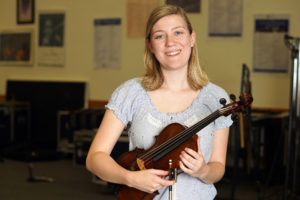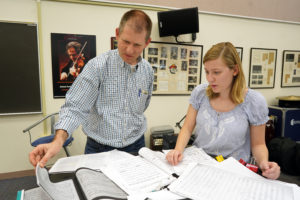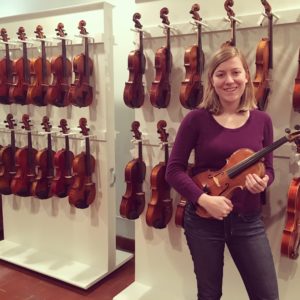When Elyse Ridder ’19 declared as a music major, she expected to perform pieces by the likes of Aaron Copland. Never could she have imagined that she’d get to finish a work by the famed American composer.

But Mary Washington made it happen.
The UMW senior, who graduates next week, has spent countless hours working alongside music department faculty to dust off and revive old and forgotten works and get the music into performable shape. Inspired by the work she has done over the past four years and the professors who have guided her along the way, she is embarking on a career that will marry her passion for music with her interests in history and libraries.
“I fell in love with detective music manuscript research here at Mary Washington,” said Ridder, who first became engaged in the field when UMW Philharmonic Director Kevin Bartram approached her during her sophomore year. He invited Ridder and a few other students to work with him on a project called Unearthing America’s Musical Treasures.
Soon she was making regular jaunts to the Library of Congress to research and complete scores of unknown and unfinished American works that were written for a full symphony orchestra. The UMW Philharmonic has since incorporated several of the finished works into its concerts.
A violinist since age seven, Ridder always planned to concentrate on performance. After all, the Fredericksburg native had played for years with the Youth Orchestras of Prince William and the Riverbend High School Orchestra, and even appeared at Carnegie Hall for the National Band and Orchestra Festival. She has performed with the UMW Philharmonic since high school and became a full-time orchestra member after enrolling at Mary Washington.
But once she began working on the Copland piece – coincidentally, her father’s favorite composer – she was hooked.
“It was an out-of-body experience looking at Copland’s signature and touching his score,” said Ridder, who spent months analyzing the composer’s messy penmanship, editing and making corrections to the score to help Bartram finish the piece. “You become part of the music. You become the person who composed the music.”

She found that the courses she took from across liberal arts disciplines – including history, historic preservation, religion and English – supported her in her work. The classes helped her better understand the backgrounds of the composers and the preservation of the music manuscripts. And overall, they made her a well-rounded student and musicology scholar.
Ridder was thrilled that several music professors new to the university could be instrumental to her studies, particularly Robert Wells, who teaches music theory, and Michael Bratt, who teaches music composition and technology.
“Mary Washington professors that specialize in a particular field can zero in on students and give them a one-on-one experience to help them grow and learn,” said Ridder, who credited the department’s small, intimate classes as the reason she was able to establish relationships with her professors and work on these projects.
She found such an experience with Brooks Kuykendall. Since her junior year, Ridder has been working with the musicology professor and department chair to reconstruct a pirated orchestration of Gilbert & Sullivan’s immensely popular “H.M.S. Pinafore,” made by a virtually unknown John Philip Sousa nearly two decades before he composed “The Stars and Stripes Forever.” Copyright laws didn’t exist when “Pinafore” premiered in 1878, so there were nearly 150 American productions a year later, Sousa’s among them.
Ridder and Kuykendall tracked down a complete set of Sousa’s orchestral parts in a library in Sydney, Australia last spring. Using various sources, including what remains of the composer’s original score in the Library of Congress, they’ve been working to complete a new edition of the piece. Dedicated to making the work accessible to everyone, Ridder and Kuykendall aren’t seeking a publisher and will make the score available for free on the Internet Music Score Library Project.

“Elyse is a fantastic research partner,” said Kuykendall, who will present on the project with Ridder in Canterbury, England this summer at a conference on British music in the 19th century. “A collaborative project can be ideal if you have someone such as Elyse who is eager to do the laborious work required.”
After graduation, Ridder plans to take a gap year to finish the projects with Kuykendall and Bartram. She’ll also work full time at Wm Mason II Violin Shop in Fredericksburg, where she’s been employed as an apprentice violin maker for the last five years. With two violins already under her belt and a third on the way, she says it’s made her more in tune with her instrument than ever before.
Ridder hopes her work at UMW and the impact she’s made on the music department will lead to acceptance into a graduate musicology program in the near future, and later, the pursuit of a doctorate.
“I’d love to work in a museum or university library researching music manuscripts. I’ve always wanted to have a desk or a door with my name on it.”
For right now, she’ll have to settle for her name on finished scores by Copland and Sousa.